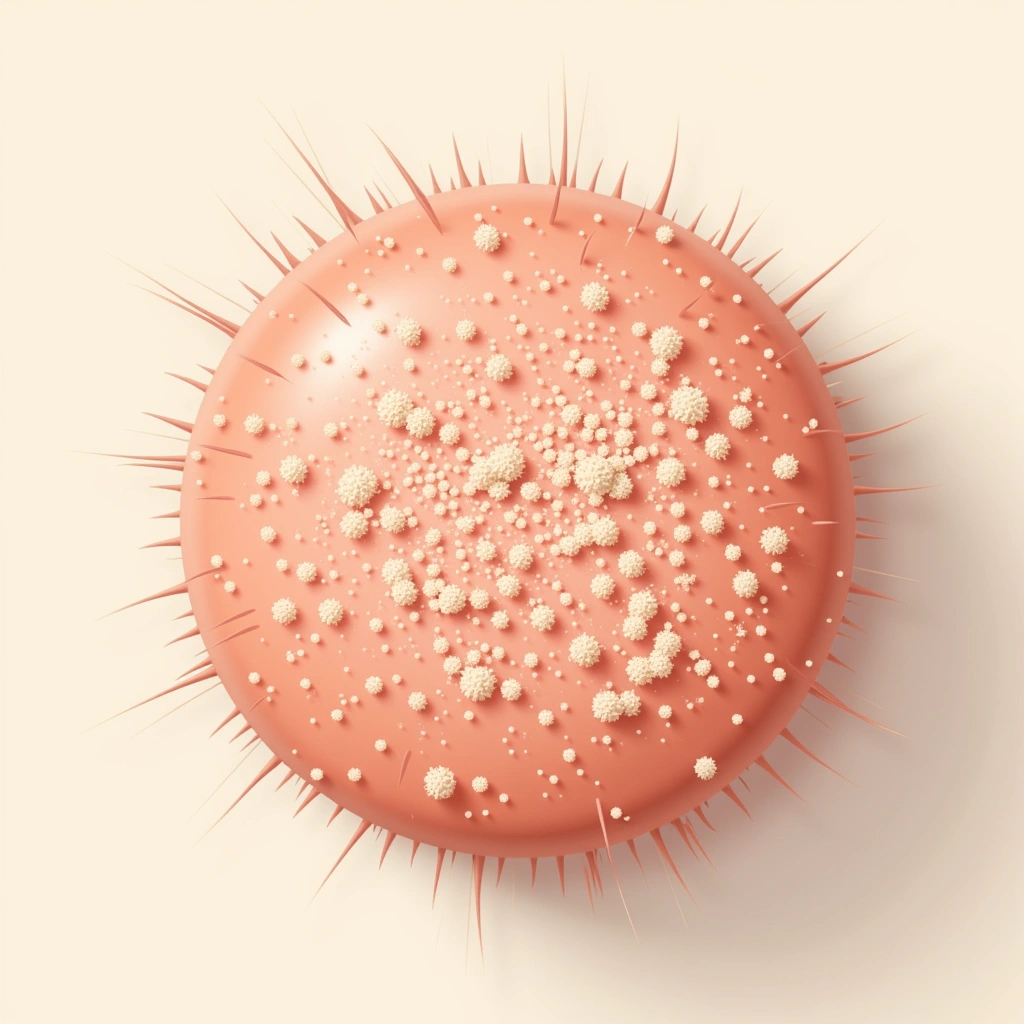- Seborrheic eczema is not contagious and cannot be passed from person to person.
- It’s related to how your body responds to naturally occurring skin yeast and is influenced by genetics and environment.
- Understanding this can help reduce worry and focus on managing the condition effectively.
TLDR; Seborrheic eczema is not contagious. You can’t catch it from someone else. It’s your skin reacting to its own natural yeast, not an infection you can spread.

What is Seborrheic Eczema?
Seborrheic eczema, or seborrheic dermatitis, is a skin condition that leads to red, scaly, and sometimes itchy patches. It mainly shows up on areas like the scalp, face, and chest [1]. Think of it as an inflammatory skin issue, not an infection.

Is Seborrheic Eczema Contagious? The Clear Answer
No, seborrheic eczema is not contagious. You cannot catch it from another person. It’s not caused by a virus or bacteria that spreads through contact. Instead, it’s your body’s reaction to the yeast that naturally lives on your skin [2].

The Science: Why It’s Not Contagious
To understand why seborrheic eczema isn’t contagious, let’s look at what causes it. Research points to a few key factors:
Your Skin’s Natural Flora and Malassezia Yeast
It seems seborrheic eczema happens because of how your body reacts to the yeast that normally lives on your skin, especially a type called Malassezia [3]. This yeast isn’t an infection you pick up; it’s just part of your skin’s natural community of microorganisms. In people with seborrheic eczema, the body seems to have an inflammatory response to this yeast.
Genetic and Environmental Influences
Genetics and environmental factors also play a role in whether someone develops seborrheic eczema [4]. This means it’s more about your individual makeup than catching something from someone else. Conditions like atopic dermatitis (eczema) and psoriasis are also non-contagious skin issues, highlighting that many chronic skin problems aren’t spread through contact [5, 6].
Key Factors in Seborrheic Eczema Development:
- Malassezia Yeast: An overgrowth and reaction to this normal skin yeast.
- Sebum (Skin Oil): Oily skin areas create a good environment for yeast to grow [7].
- Immune System and Genetics: How your immune system responds and your genes influence your susceptibility [8, 4].
Because these factors are internal and relate to your own body’s systems, seborrheic eczema isn’t something you can “catch” from someone else.

User Experiences: What People are Saying
Beyond the scientific research, looking at what people with seborrheic eczema and those around them experience can also be helpful. Many online discussions reflect the understanding that this condition is not contagious.
Misconceptions and Confusion
Sometimes, people mistake seborrheic eczema for contagious conditions because it involves a fungus (Malassezia yeast). Some users online have shared stories of thinking they had a contagious fungal infection when it was actually seborrheic eczema. One user found relief with antifungal treatments, leading them to believe their “eczema” was misdiagnosed and was fungal [9]. This highlights how similar symptoms can cause confusion.
The Fungal Connection Explained
It’s important to clarify that while Malassezia yeast is involved in seborrheic eczema, it’s not like a contagious fungal infection such as ringworm. Ringworm is caused by a fungus that is easily spread, while Malassezia is naturally present on everyone’s skin. Seborrheic eczema is a reaction to this yeast, not an infection you catch [10,11].
Living Together: No Contagion Concerns
Many individuals online share their daily lives with family members who have seborrheic eczema without any worry about getting it themselves. On platforms like Reddit, users often mention partners or family members with the condition, focusing on treatments and management rather than contagion [12]. This real-world experience supports the medical consensus that seborrheic eczema is not passed from person to person.

Treatment Insights from User Experiences
People with seborrheic eczema try various treatments, and their experiences offer insights, though they don’t change the fact that it’s not contagious.
Salt Water and Special Shampoos
Some users find success with simple remedies. One user shared, “I cured the seborrheic dermatitis on my face with salt water, after trying everything else,” detailing a salt water application method [15]. Others find relief with specific shampoos. Another user reported, “what has worked super well for me is a double wash… The key for me is letting the head and shoulders sit on my scalp for at least 5 minutes,” emphasizing the zinc in the shampoo for fungal control [16].
Antifungal Shampoos: A Common Success
Antifungal shampoos like Nizoral are frequently mentioned as effective. One person described dramatic results: “I ordered the shampoo, used it for the first time yesterday… and I could almost cry… this shampoo basically nuked my dandruff, almost over night” [17]. These treatments target the yeast aspect of seborrheic eczema, but their effectiveness doesn’t imply the condition is contagious.

Preventing Recurrence: User Tips
While you can’t “reinfect” someone else with seborrheic eczema, users discuss ways to manage their own symptoms and prevent flare-ups.
Keeping Skin Dry and Avoiding Irritants
A common tip is to keep affected areas dry. One user was advised by their doctor “not to allow my scalp to stay wet. She said I must dry my skin as fast as possible” [18]. Avoiding certain products is also mentioned, with advice to “Avoid ingredients that feed the yeast” and to check product ingredients using resources like https://www.sezia.co/ [19]. Coconut oil is specifically cautioned against by some, as it can “act as a massive food source for fungus!” [20].

Conclusion and Key Takeaways
Seborrheic eczema is a common, sometimes frustrating, skin condition. However, it’s important to remember that it is not contagious. It arises from your body’s unique reaction to naturally occurring skin yeast and is influenced by individual factors, not by catching it from someone else.
- Seborrheic eczema is not contagious: You cannot spread it to others through contact.
- It’s caused by your body’s reaction: Specifically, to Malassezia yeast, which is a normal part of skin flora.
- Genetics and environment play a role: These factors make some people more prone to developing seborrheic eczema.
- User experiences confirm non-contagious nature: People living with those who have seborrheic eczema do not report “catching” it.
- Focus on management, not contagion: Treatments aim to control symptoms and reduce flare-ups in the individual, not to prevent spread to others.


No Comments
Be the first to start a conversation